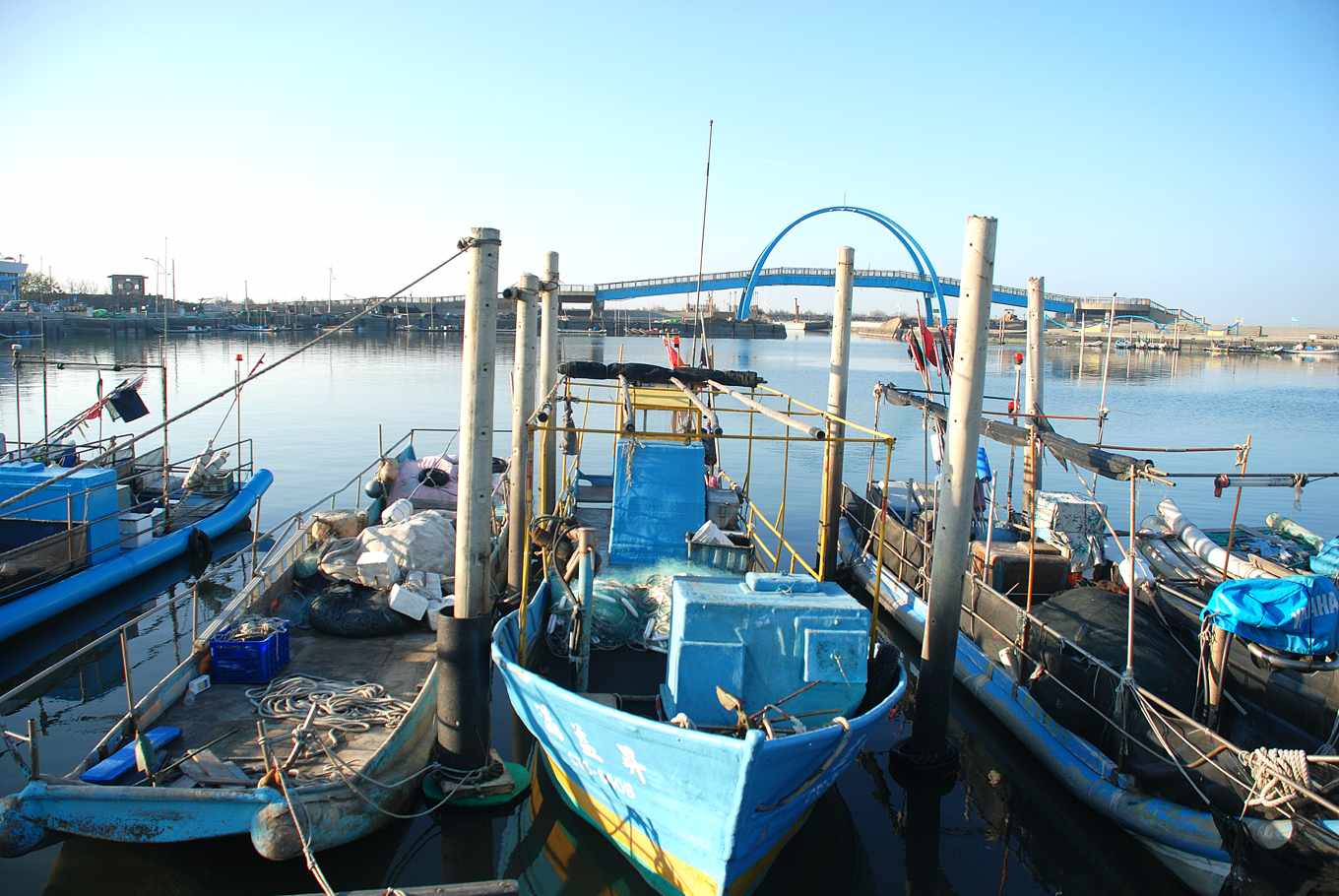Fishery Survival under Fan 02 "Changhua fishing Association promotes symbiosis and reconciliation, operators invest in the construction of marine pastures, fishing rights groups: do not draw big cakes.
0share
Wind power development has been raging, and disputes have repeatedly exploded. As a target area, Changhua County will be filled with wind turbines, and traditional fishing along the offshore will soon disappear. After years of conflict and confrontation, since 2019, the Fisheries Association has proposed a "reconciliation and symbiosis" program funded by wind power industry, and will soon establish the "Changhua Offshore Wind Power Fisheries Co-Prosperity Foundation" to promote Changhua's sustainable fisheries plan and transform it into "marine pasture".
wu fei chun, a researcher at the center for fishermen's rights and environmental sustainability, worries that the concept of ocean pastures is still "painting a pie." the first phase of miaoli's demonstration wind farm, which experimented with cage farming, has yet to produce concrete results. Now that the Changhua wind farm is about to start construction, the livelihood of fishermen is an urgent issue, and we can no longer just give imaginary visions!" (Background reading: Thousands of wind turbines will be inserted in the open sea of Changhua, and fishermen will be forced to withdraw)


(Photo/Tortoise) Chen Chu-tsan, Director-General of Changhua Fishery Association: Although the road of transformation is cruel, it has to be taken
"The transition to fishing is a painful process, and some people may be able to get a job as a whale spotter or a lookout boat after vocational training, but most people may leave the sea." "Chen Zhuzan, Director General of Changhua District Fishery Association, said frankly
"For these fishermen with limited education, they are likely to face livelihood difficulties if they want to leave the sea to seek jobs on land. The fishing association will definitely find ways to keep these people working at sea, so we must find a new way out." Chen Zhuzan added,"Moreover, fishermen have been at sea for a long time, and their personalities have long been accustomed to independence and freedom. I am afraid they will find it difficult to adapt to the outside world. If they want to continue fishing, they may have to move their families."
The idea put forward by the Changhua District Fishery Association is that wind power developers will provide funds, cooperate with the Fishery Association, the Energy Bureau and the Fisheries Department to establish a platform, and entrust experts and scholars to develop specific plans for the sustainable development of marine resources and fisheries. These include "marine pastures", allowing fishermen to switch to marine box net farming, or releasing fish reefs, allowing fishermen to change their fishing methods from traditional gill nets to one-shot fishing.
Mr Chan also proposed a number of alternative projects, including "cultivation fisheries", setting up new nursery centres to release fish and shellfish fry; and recreational fisheries to advise fishermen to switch to sightseeing fisheries and take tourists overseas for fishing.
Chen Zhuzan said that the foundation has entered the preparatory stage. At present, most of the five wind power operators in Changhua have agreed to participate, and only one is still waiting. Two preparatory meetings have been held, and the initial start-up fund is 200 million yuan, which will be available by the end of the year and will gradually expand with the experiment in the future.
Energy Bureau: If offshore wind power and fishery can flourish together, they will be extended to other counties and cities.
Chen Chongxian, head of the Energy Technology Group of the Energy Bureau of the Ministry of Economic Affairs, pointed out that offshore wind power can only use the space above the sea surface, and there is still fishing potential in the lower sea area. He hoped that wind power development and fishing can be combined with the concept of symbiosis. "It's still in the research and development stage and requires a lot of experiments. If it succeeds, it will not only resolve the conflict between offshore wind power development and fisheries, but will also become a model for Taiwan."
Will there be an official background to the foundation's composition as the authority responsible for facilitating the submission of funds by operators? Chen Chongxian clarified,"This is a purely private funding, private initiative foundation, there will be no official participation." He emphasizes that "at present, marine pasture or box farming is still being studied on a small scale. If Changhua can succeed, it will be extended to other counties and cities."
Liu Jiazhen, deputy head of the Fishery Administration Group of the Fisheries Department, believes that in the future, the goal of this foundation will be set at "offshore wind power and fishery co-prosperity", and the prototype is still in communication and coordination. It is initially established that it will not belong to the fishing association or wind power industry, and will operate completely in an independent consortium legal person manner to ensure independence and impartiality.
Taipower: will cooperate with the policy to do preliminary basic research
Wind power development in Changhua County has cut Changhua's offshore waters into pieces, and originally forced the fishing industry to die out. However, since last year, the "coexistence and prosperity plan" for wind power and fishing has gone from being out of reach to taking shape. The Department of Energy and the Fisheries Department, which have the power to create and kill development projects, have applied both soft and hard, and local developers and foreign investors of wind power have had to pay.
The five companies that have obtained Phase II licenses in Changhua are Waugh, Copenhagen (CIP), Sinoenergy (Sinosteel Development, now operated by CIP), Taipower and Canada's Northern Land Energy (NLP). Taiwan Power is the only developer with a government-owned background, and it has also allocated the first sum of funds to Ou Qingxian to carry out initial research and to carry out a box fishing investigation in the five islands of Kyushu, Japan.
Tsai Ying-sheng, director of Taiwan Power's renewable energy department, revealed that because the Communist Youth Fund is led by the Energy Bureau and the Council of Agriculture, Taiwan Power, as a state-owned enterprise, has the obligation to support it. Most of the other developers selected for entry also agreed, only one is still under consideration, and has now progressed to the specific implementation stage.
"Due to the limited land and sea area, offshore wind power refers to the spirit of rooftop photovoltaic and fishing-electricity symbiosis, hoping to develop towards symbiosis, providing sustainable fisheries management while generating electricity, rather than single utilization." Tsai Ying-sheng explained,"Taiwan Power is a state-owned enterprise after all. When private investment is not good, Taiwan Power can cooperate with basic work and provide future policy or company operation reference. Therefore, the initial research funds are funded by Taiwan Power."
- Prev

Pingtung Hot Expo countdown last 8 days, real link system registration into the park draw limit blessing bag
Pingtung County-The Pingtung Tropical Agriculture Expo hosted by Pingtung County was opened from February 6 to March 1. It was a high-quality choice for spring outing in the south. In response to the epidemic situation, the whole park adopted the real association system to register into the park.
- Next

The survival of fisheries under wind turbines 01 "Changhua offshore will insert thousands of wind turbines, fishing fishermen forced to withdraw, transformation is imminent
The survival of fisheries under wind turbines 01 "Changhua offshore will insert thousands of wind turbines, fishing fishermen forced to withdraw, transformation is imminent
Related
- A course of planting techniques and methods on how to grow carrots
- How to plant the latest tulips?
- Is it better to pick tea in the morning or in the afternoon? When is the best time for tea to be picked? what is the third or fifth tea?
- Launch Yuanxiao Happy combination Haocha + Tea Yuan healthy Taste
- Penghu Tourism "Fireworks 20 Parade with You"
- 2022 West Lake Happiness holds "Digital Revitalization Voucher" and draws iphone13 and laptop.
- Banqiao Fuzhou social houses are designed to change start-up combined with police elimination to create a safe and livable environment
- The convenient measure of "mechanical weeding" in Xinbei has been abused and the Agriculture Bureau has imposed heavy penalties on the illegal land consolidation.
- Changgeng University Joins Hands with Four Memory Factories to Rescue Memory Talent Shortage
- The list of Taiwan's top 100 MVP managers is listed by the Director-General of the Farmers' Association of Sanxia District.

